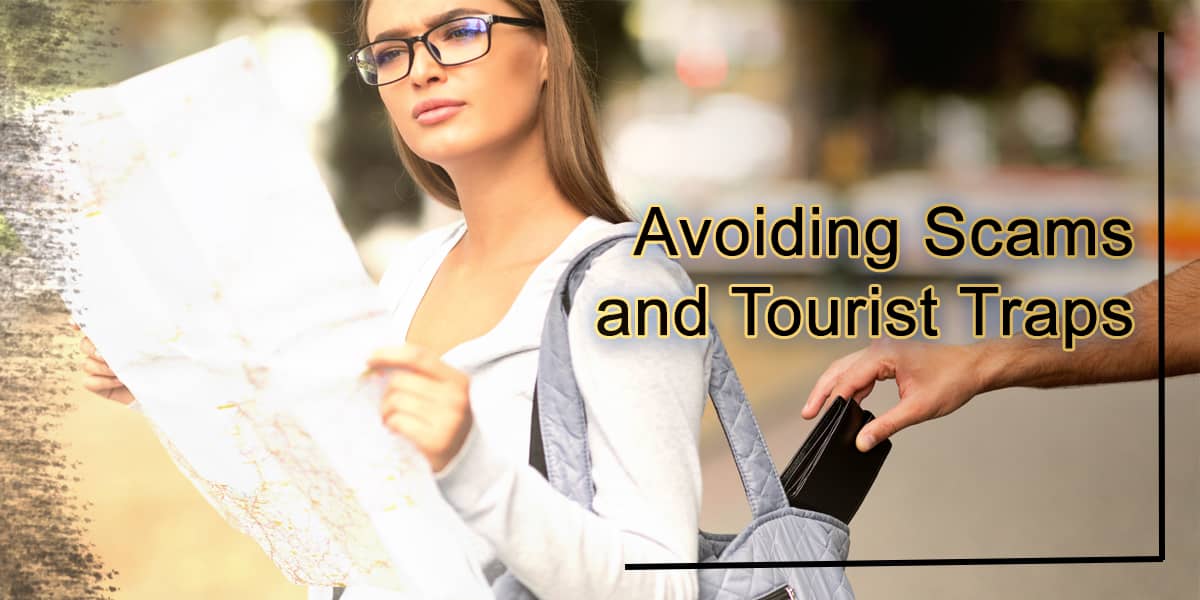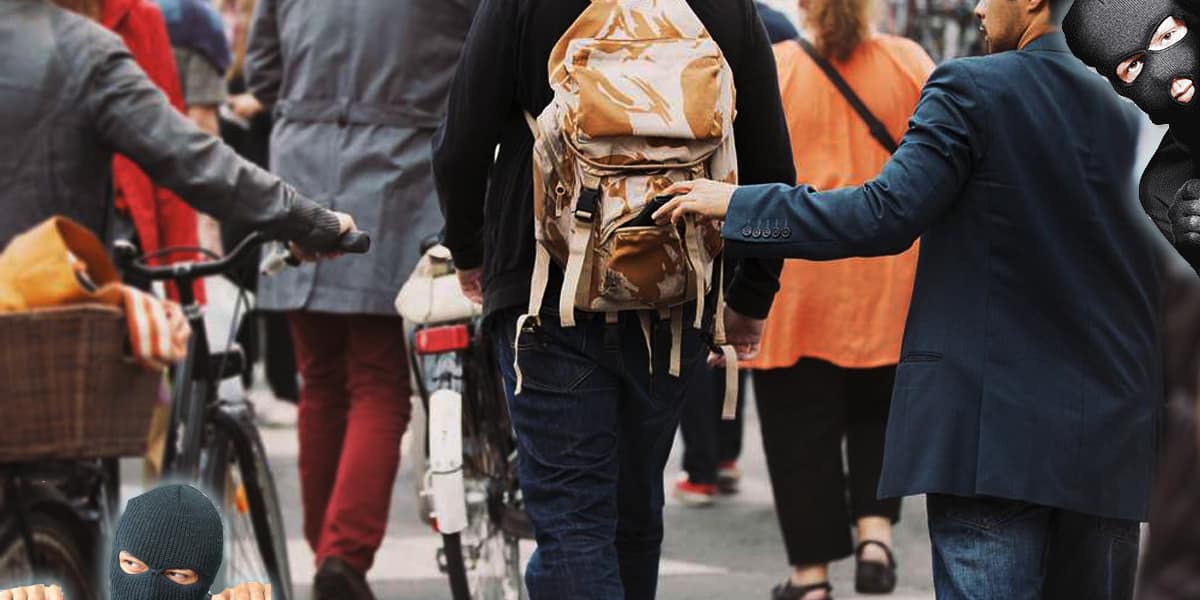Avoiding Scams and Tourist Traps: Your Ultimate Guide to Travel Safety

Avoiding Scams and Tourist Traps: Your Ultimate Guide to Travel Safety
Traveling to new and exciting destinations is a dream come true for many people. However, amidst the joy and anticipation of exploring unfamiliar lands, it’s important to be aware of potential scams and tourist traps that can turn your dream vacation into a nightmare. This comprehensive guide will delve into common scams that target tourists and provide practical tips on recognizing and avoiding them. By staying vigilant and well-informed, you can protect yourself and enjoy a safe and hassle-free journey.
index
ToggleThe Fake Ticket Agent Scam
One of the most common scams is the fake ticket agent scam, where individuals posing as ticket agents approach tourists and offer discounted or exclusive tickets to popular attractions, events, or transportation services. To avoid falling victim to this scam, follow these tips:
⦁ Purchase tickets from authorized vendors or reputable online platforms.
⦁ Research the official prices of tickets in advance to have a clear idea of what to expect.
⦁ Be cautious of individuals who approach you on the street with unsolicited offers.
The Overpriced Taxi or Tuk-Tuk Scam
In many tourist destinations, taxi or tuk-tuk drivers can take advantage of visitors’ unfamiliarity with local routes and fares. To avoid being overcharged:
⦁ Research the average taxi fares or use reliable ride-hailing apps to estimate the cost of your journey.
⦁ Insist on using a meter or agree on a fixed price before starting the ride.
⦁ Avoid taking rides from unlicensed or unofficial taxis.
The Distraction Technique
Scammers often work in pairs or groups to distract tourists while stealing valuables. They may spill something on you, ask for directions, or engage in any other activity to divert your attention. Here’s how to protect yourself:
⦁ Stay vigilant and aware of your surroundings, particularly in crowded tourist areas.
⦁ Keep your valuables secure in a money belt or hidden pouch.
⦁ If someone tries to distract you, politely decline and walk away.
The Restaurant Menu Switch
In certain tourist traps, restaurants may lure unsuspecting visitors by showcasing enticing menus with low prices. However, a different, inflated bill is presented when it’s time to pay. Follow these steps to avoid this scam:
⦁ The research recommended restaurants before your trip, seeking advice from reputable sources like travel websites or local recommendations.
⦁ Compare prices and menus of nearby restaurants to ensure they are consistent.
⦁ Request a printed bill with a detailed breakdown of charges.
The Friendly Local’s Advice
While most locals are genuinely helpful and friendly, a few may exploit tourists’ trust for personal gain. Scammers may offer unsolicited advice or insist on guiding you to a particular shop, tour, or attraction where they receive a commission. To avoid falling victim:
⦁ Gather information from multiple sources such as guidebooks, official tourism websites, or verified online forums.
⦁ Be cautious of individuals who approach you first or seem overly eager to assist.
⦁ Trust your instincts and politely decline offers that make you uncomfortable.
The Fake Police Officer Scam
Beware of individuals impersonating police officers who approach tourists and ask to see identification or claim there is a security threat. To protect yourself:
⦁ Ask for official identification and badge before complying with any requests.
⦁ Offer to accompany the officer to the nearest police station if you have doubts about their legitimacy.
⦁ Contact the local tourist police or embassy if you suspect foul play.
The ATM Skimming Scam
Criminals may install skimming devices on ATMs to capture card information and PINs. To avoid falling victim:
⦁ Use ATMs located in well-lit and secure areas.
⦁ Inspect the ATM for any suspicious devices or loose components.
⦁ Shield your PIN entry with your hand or body.
The “Found” Ring or Bracelet Scam
Scammers may approach tourists claiming to have found an expensive ring or bracelet and offer to sell it at a bargain price. Stay cautious:
⦁ Avoid engaging with strangers who come to you with such offers.
⦁ Remember that strangers rarely sell genuine valuables on the street.
⦁ Report any suspicious behavior to local authorities.
The Closed Attraction Scam
Scammers may inform you that a popular attraction or landmark is closed for various reasons and redirect you to another location where they receive a commission. Protect yourself:
⦁ Verify attractions’ opening hours and status through official websites or local tourist information centers.
⦁ Be skeptical of unsolicited advice or recommendations from strangers.
⦁ Seek recommendations from trusted sources or fellow travelers.
The Unlicensed Tour Guide Scam
Some individuals may pose as tour guides without the necessary licenses or qualifications. To ensure an authentic and safe experience:
⦁ Choose tour operators or guides recommended by reputable travel agencies or accommodations.
⦁ Ask for proof of certification or licenses before booking a tour.
⦁ Research reviews and feedback from previous travelers to verify the guide’s credibility.
The Fake Charity or Donation Scam
Scammers may approach tourists, claiming to represent a charitable organization and request donations. Protect yourself from this scam:
⦁ Donate directly to well-known, registered charities through official websites or local offices.
⦁ Be cautious of individuals who pressure or guilt-trip you into making donations on the spot.
⦁ Research and verify the legitimacy of the charity before contributing.
The Rental Property Scam
When booking vacation rentals online, scammers may advertise fake properties, collect payments, and disappear. Avoid falling victim to this scam:
⦁ Use reputable booking platforms with secure payment systems and verified listings.
⦁ Research the property and read reviews from previous guests.
⦁ If necessary, communicate directly with the property owner or manager and ask for additional information or photos.
The “Free” Souvenir Scam
Beware of individuals offering free souvenirs or gifts, as they may later demand payment or engage in aggressive sales tactics. Protect yourself:
⦁ Decline unsolicited offers for free items from strangers.
⦁ Avoid engaging in conversation or accepting gifts from individuals who seem overly insistent.
⦁ Be wary of buying anything with hidden costs or obligations attached to it.
The Pickpocketing Scam
Pickpockets often target crowded tourist areas, public transportation, or popular attractions. Stay alert to prevent theft:
⦁ Keep your belongings close to your body, preferably in a bag with a secure closure.
⦁ Avoid keeping valuable items in easily accessible pockets.
⦁ Be cautious of overly crowded spaces and remain aware of suspicious behavior.
The Fake Wi-Fi Network Scam
Hackers may set up fake Wi-Fi networks with names similar to legitimate ones in tourist areas. Protect your sensitive information:
⦁ Use virtual private networks (VPNs) to encrypt your internet connection.
⦁ Connect only to known and trusted Wi-Fi networks, preferably password-protected ones.
⦁ Avoid accessing or transmitting sensitive data while connected to public Wi-Fi.
Conclusion
While traveling, staying informed about common scams and tourist traps is crucial to protect yourself and ensure a memorable experience. By familiarizing yourself with these tactics and implementing preventive measures, you can confidently and confidently navigate unfamiliar territories. Remember to research, stay vigilant, and rely on trusted sources of information. By doing so, you’ll be able to enjoy your journey, discover new cultures, and create lasting memories while keeping scammers at bay.
Recent Posts
Contact Us
+1 437 499 4559










